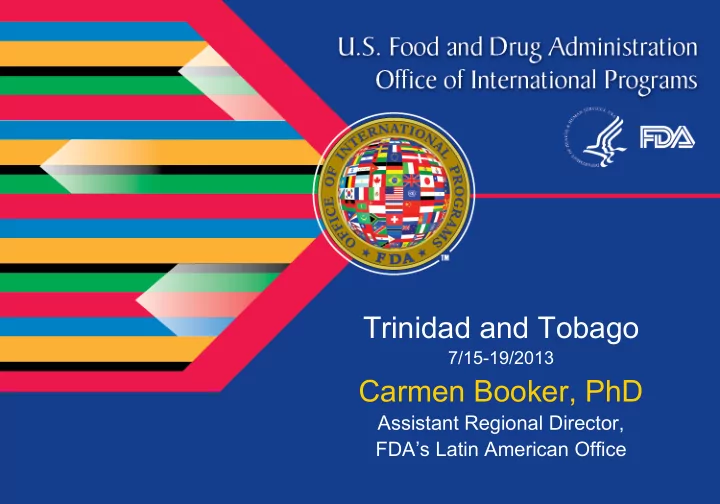

Trinidad and Tobago 7/15-19/2013 Carmen Booker, PhD Assistant Regional Director, FDA’s Latin American Office
FDA in Latin America Overview: – Challenges of Globalization • The triggering factors → International • Wake-up calls • FDA’s international efforts – FDA’s Foreign Offices • FDA Latin American Office (LAO). – History – Regional Profile – Roles and Responsibilities – Ongoing Activities – The Future
FDA’s Responsibilities: More than foods. FDA regulates – Pharmaceuticals human and animal (brand, generic, OTC) – Vaccines – Medical Devices – Cosmetics – Biologics (tissues, plasma products) – Feed for animals, and medicated feed – Tobacco – Foods (excluding meat-USDA, except exotic meat)
Regulatory Challenges • Imports since 2002 have increased by 13% each year, resulting in a four fold increase in products produced outside of the U.S. • 50% of fresh fruits, 20% fresh vegetables, 80% of seafood, 80% of APIs are from foreign sources. • Foreign inspections vs. foreign manufacturers • Borders can no longer be a first line of defense • Difficulty in detecting harmful products at the border • Best defense – primary prevention – build in safety & quality at the source – collaborate and leverage resources
Today’s Reality • More imported products • More international providers of these products • More international sub-contractors being used for manufacturing and clinical trials • Imports coming from countries whose regulatory systems are not fully developed • More opportunity for economic fraud, counterfeiting, acts of bioterrorism • More complex supply chains
The Challenges Associated with Complex Global Supply Chains
Latest Wakeup Calls • Melamine in pets foods and in infant formula • Listeria in cheese, guacamole, etc. • DEG in glycerin used in teething gel and in cough syrup • Salmonella in mamey pulp, peppers, cantaloupes, etc. • Counterfeit diabetic test strips • Gentamicin pyrogenic reactions • Heparin ( Oversulfated Sulfate ) Chondroitin • What’s next?
FDA’s International Focus • The OIP/ORA Reorganization – Directorates • The Pathway to Global Safety and Quality (report) • Global Engagement Report • IOM Study on Strengthening Regulatory Systems • FSMA • GDUFA
FDA’s Food Safety Modernization Act (Capacity Building) FSMA Section 305 – FDA shall develop a comprehensive plan to expand the technical, scientific, and regulatory food safety capacity of foreign governments, and their respective food industries, from which foods are exported to the United States. Capacity building is one of the non-regulatory tools FDA has available to help strengthen its efforts in preventing food safety problems in the global supply chain. The plan shall include, as appropriate : 1. Recommendations for bilateral and multilateral arrangements and agreements, including provisions to provide for responsibility of exporting countries to ensure the safety of food 2. Provisions for secure electronic data sharing 3. Provisions for mutual recognition of inspection reports 4. Training of foreign governments and food producers on United States requirements for safe food 5. Recommendations on whether/how to harmonize requirements under Codex Alimentarius 6. Provisions for multilateral acceptance of lab methods and testing/detection techniques Plus evidence based decision making, partnerships and assessment analysis FDA’s new International Food Safety Capacity-Building Plan http://www.fda.gov/Food/FoodSafety/FSMA/ucm301708.htm 9
FDA’s presence overseas • FDA’s Foreign Posts (12 locations) China Beijing, Guanzhou, – Shanghai, India New Dehli, Mumbai, Costa Rica San Jose, Mexico, Chile United Kingdom London, Belgium Brussels, Jordan Amman, South Africa Pretoria • Increasing Staff • FDA’s Latin American Office: – Opened in 2009
FDA’s Latin America Office • LAO includes 44 countries and territories in Central America, South America and the Caribbean • Imports from Latin America: – 41% of all imports • 59% Devices • 40% Foods • 1% Drugs, biologics, tobacco, feed • 99% of imports from the region come from 12 countries – Mexico – Dominican Republic – Chile – Guatemala – Costa Rica – Colombia – Brazil – El Salvador – Peru – Argentina – Ecuador – Honduras 11
Snapshot of Import Statistics FY11 Top Reasons for Refusals (minus Mexico) Top 12 exporting Unapproved Drugs countries and Salmonella reasons for Labeling refusals Inspections (GMP, etc) Pesticides 1. Mexico 2. Dominican Republic Not Listed 3. Chile 4. Guatemala Top Reasons for Refusals for Mexico (more than 100 lines 5. Costa Rica refused) 6. Colombia Not Listed 7. Brazil 8. El Salvador Unsafe Colors 9. Peru Labeling (English, ingredients, Colors) 10. Argentina UNAPPROVED Drugs 11. Ecuador Pesticides in food 12. Honduras Inspections Salmonella
Trinidad and Tobago • Valid Food Facility Registrations: 80 (2012, compared to over 24k in Mexico and 682 in Jamaica) • Number of Device Registrations: 1 • Number of Drug Registrations: 1 • Total Lines from Jamaica: 11,060 (2012) – Other English-speaking Caribbean countries were Jamaica with 17,906 lines and Surinam with 2,179 lines • Total Refused Lines: 40 – Reasons for refusals: Filthy, Improper Labeling, Firm not Registered, Unapproved Drug
Ongoing Activities • Country profiles • Validating contacts within the region • Build capacity and an understanding of foreign regulatory systems • Environmental scans • Project to enhance the class 1 recall process • Identifying ways to leverage with foreign governments – Regulatory actions • Analytical papers • Presentations and translating documents • Training on FSMA, import procedures, FDA’s requirements (FDA 101)
Latin America’s Strategic Objectives • Ensure that stakeholders in the region are informed about FSMA • Identify our office’s role in an emergency – Optimizing FDA’s emergency response and communication within the region • Establish a communication mechanism with foreign government counterparts who can take action based on FDA information • Establish effective mechanisms for continual communication with all centers/offices within FDA • Build laboratory capacity within the region • Develop a procedure for planning foreign inspections • Inform stakeholders about the Generic Drug User fee act • Update the contact lists for each country within the region
The Future Product safety is everyone’s responsibility!
Thanks Contact Information and Questions US-FDA-LAO@fda.hhs.gov US Embassy Costa Rica – (506) 2519-2224 Carmen.Booker@fda.hhs.gov (506) 2519-2221
Recommend
More recommend